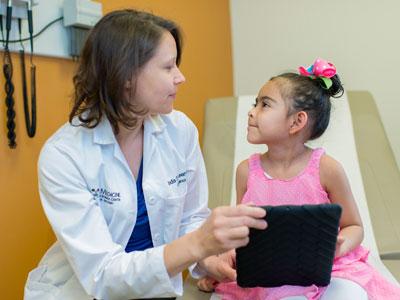As a volunteer at a local hospital while she was still in high school, Linda D. Leary, M.D., provided play therapy to young patients.
“I really enjoyed my time with the children,” she said. “When children are sick, they are still very upbeat. They are still children. I loved their positive outlook.”
Now as a pediatric epilepsy specialist, Dr. Leary is able to offer hope and personalized treatment to youngsters suffering from seizures. Her patients range in age from birth to 21.
Dr. Leary, a clinical associate professor of pediatrics and neurology at the UT Health San Antonio, said she chose to concentrate on pediatric epilepsy within the field of neurology because “you can have the most impact on children’s lives.
“With epilepsy, you can offer medications, diets, devices and surgery. We have many treatments we can bring to the patients to help them gain control of their seizures.”
Dr. Leary said stopping or reducing the frequency of seizures is important because seizures are so unpredictable and can be dangerous. While young children do not drive or usually perform tasks where their lives or others may be in danger, the seizures can happen in front of friends or at school. “Seizures can be very embarrassing for children socially,” she added.
Seizures in children take many forms
Some parents do not immediately recognize that their children are having seizures, she said. Epilepsy includes a spectrum of different types of seizures. For example, absence seizures are very subtle, Dr. Leary said. “The child will just stop and stare for a period of time. People don’t identify that as a seizure.”
Parents may initially notice a child having an unprovoked seizure during the first couple of years of life, Dr. Leary said. “However, some epilepsy syndromes are seen more commonly in school-age children. These children often inherit the genetic tendency from their parents. Some may outgrow the epileptic seizures by puberty.”
When Dr. Leary first examines a patient at UT Health San Antonio’s Medical Arts & Research Center or at the University Health System’s Robert B. Green Campus, she takes a medical history of the child and the parents to see what risk factors or triggers for seizures are present.
At the South Texas Comprehensive Epilepsy Center at University Hospital, the child will undergo an MRI and an EEG so Dr. Leary can determine what part of the brain is involved in the seizures. The best course of treatment can be settled upon once the doctor knows the type of seizure a child is experiencing.
The South Texas Comprehensive Epilepsy Center, which is a partnership between University Health System and UT Health San Antonio, is the only center to receive a Level 4 designation in San Antonio. Level 4 is the highest accreditation a center can receive from the National Association of Epilepsy Centers.

